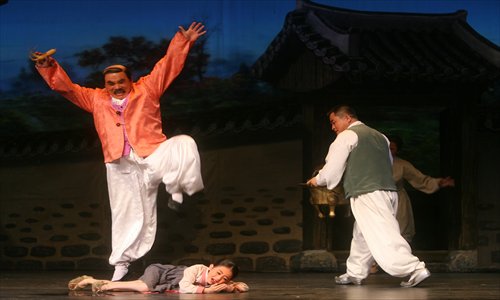'The Flower Girl'

North Korea's Sea of Blood Opera Troupe brought their classic The Flower Girl to China recently. Having performed in eight cities so far, the group will stop in Beijing to stage shows at the National Centre for the Performing Arts (NCPA) from July 19-22.
The Flower Girl features a girl who picks flowers to sell in the market in order to support her family. With a blind sister and a sick mother at home, the family experiences a tough time, ruled by an oppressive landlord. After the death of the mother, the eldest son escapes from prison and saves his two sisters.
The opera's 24-year-old leading performer Chae Chul-ok is the fifth generation of her family to play the protagonist.
The stage designer told Chengdu Daily that the set, sound effects, lighting and costumes have all improved since their last performance in China in 2008. A LED screen displays scenes and subtitles from the film.
Revolutionary opera
The Flower Girl is one of North Korea's five great revolutionary operas, a handful of classical, revolution-themed operas.
Two generations of leaders in North Korea have contributed to the performances. According to Kim Il-sung's memoir, he wrote the script for the opera in 1930 in Jilin Province, China. After a few rehearsals, the performance was staged for the 13th anniversary of the October Revolution of the same year.
The Flower Girl was turned into a film in the 1970s, directed by Kim Jong-il. The deputy head of the opera troupe Joo Young-il once told the Chinese press that Kim Jong-il personally selected the 38 songs in the film among 2,200 song choices.
The opera was revised in the 1970s. Joo said that the performance was considered a breakthrough for North Korea, in terms of its innovative stage design, acting and composing.
Almost all the performers were graduates of Pyongyang University of Music and Dance, the top music university in North Korea. The singers combine the use of western opera vocals and Korean ethnic vocal styles in the opera.
The film adaptation of the opera impressed Chinese audiences in 1972. The dialogue in the film was dubbed to Chinese, with song lyrics in Korean.
Since its official debut in 1973, The Flower Girl was staged almost 1,500 times around the world. This is the fourth time for The Flower Girl to come to China.
Nostalgic audiences
The first performance of the North Korean production graced the Great Hall of the People in Beijing 40 years ago, moving Chinese audiences with the storyline, singing and dancing. Despite the language barrier, the play emotionally resonated with its audiences.
In 2008, the Sea of Blood Opera Troupe gave five performances of The Flower Girl at the NCPA to a packed crowd every night, a rare phenomenon for a foreign opera in China.
Recently, Qujiang Performing Arts Group in Xi'an held an event for audiences to bring in old items from The Flower Girl. One audience member brought a poster of film, collected over 40 years ago. A 70-year-old film projectionist kept the old film tapes of The Flower Girl, which can still be played with a projector.
A member of the Qujiang Performing Arts Group said that The Flower Girl is part of the collective memory for older Chinese audience members.
The Sea of Blood Opera Troupe has performed in China many times, not only native operas but innovative adaptations of Chinese classics. In 2010, they performed their adaptation of the The Dream of Red Mansion, based on the Chinese novel. Earlier this year, with the help from the Chinese counterparts, they staged the opera The Butterfly Love, another famous Chinese story.
The group plans on adapting the Chinese story, The White Haired Girl, which has a similar theme to The Flower Girl.